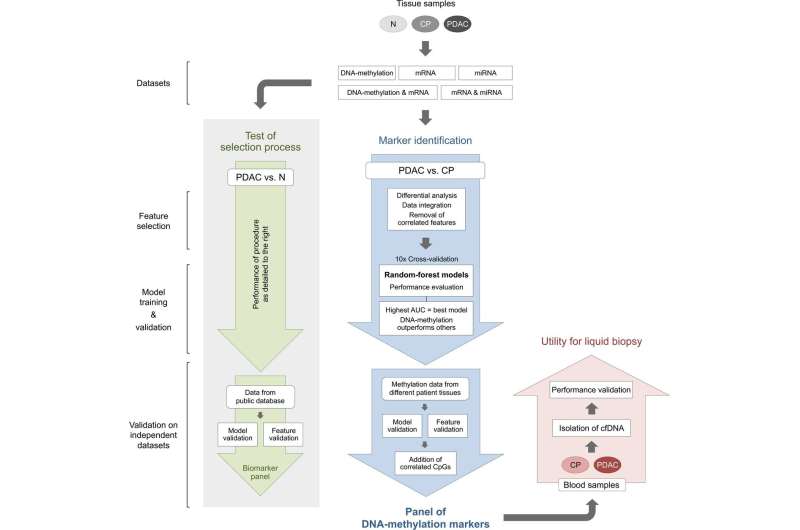This article has been reviewed according to Science X's editorial process and policies. Editors have highlighted the following attributes while ensuring the content's credibility:
fact-checked
peer-reviewed publication
trusted source
proofread
How to better distinguish chronic inflammation and cancer of the pancreas

Current diagnostic methods do not always reliably distinguish between chronic inflammation of the pancreas and pancreatic cancer. About one third of all diagnoses are inconclusive. Scientists from the German Cancer Research (DKFZ) and from the Heidelberg University Hospital (UKHD) therefore searched for molecular markers that could specify this diagnosis.
Supported by machine learning, they were able to identify a pattern of DNA methylations that allowed high accuracy in distinguishing between chronically inflamed and malignantly altered tissue samples. First preliminary results suggest that diagnosis could be performed on blood samples.
Cancer of the pancreas or PDAC for short ("pancreatic ductal adenocarcinoma"), has a dramatically poor prognosis. The reasons for this are its usually late detection at an advanced stage, misdiagnosis and its marked resistance to available therapies.
Imaging techniques are usually used for diagnosis. But these have the disadvantage that they cannot always reliably distinguish pancreatic cancer from chronic pancreatic inflammation. Chronic inflammation is considered an important risk factor for pancreatic cancer. About 6 to 9 percent of patients suffering from chronic inflammation of the pancreas later develop pancreatic cancer. But imaging and even ultrasound-guided fine-needle biopsy too often also provide incorrect diagnoses.
"This is dramatic for the patients: if a malignant tumor is misdiagnosed as chronic inflammation, they lose valuable time to treat the disease. However, if doctors mistakenly think an inflammation is a carcinoma, the patient has to undergo a serious surgical intervention unnecessarily," says Jörg Hoheisel of the German Cancer Research Center.
To improve this situation and find molecular markers to arrive at more precise differential diagnoses, Hoheisel has now joined forces with physicians at Surgical University Clinic Heidelberg to conduct a large-scale study of pancreatic tissue samples. The team analyzed 345 tissue samples (PDAC, chronically inflamed and healthy), and then validated the results on an independent set of 48 additional samples. Prior to this, the material used had been independently assessed twice by experienced pathologists.
The analysis included genome-wide variations in DNA methylation as well as mRNA and microRNA amounts. To filter out relevant differences between malignant tumors and chronic inflammation from the wealth of data, the researchers used machine learning approaches. Other, commonly used methods did not yield useful results. It turned out that differences in DNA methylation allowed substantially higher accuracy with far fewer biomarkers than the mRNA or microRNA data.
A signature of six methylation positions in the PRKCB gene provided the clearest discrimination. This allowed correct identification of inflammatory and malignant tissues.
For clinical use, it would be more advantageous if the analyses could be performed on blood instead of tissue samples. Such blood analyses, which detect the small amounts of DNA that circulate in the blood, are also known as "liquid biopsy."
The Heidelberg team therefore also applied the six methylation markers to a small number of blood samples from patients with chronic pancreatitis or pancreatic cancer to demonstrate their applicability in blood as well. As previously in tissue, the methylation markers were able to diagnose patients with high accuracy.
"Of course, the procedure must be validated on a large number of blood samples and confirmed in a trial under clinical conditions in order to finally assess its actual benefit for clinical practice," says Jörg Hoheisel, senior author of the publication. "If the result is confirmed in this process, it could have a significant impact on clinical care and patient prognosis."
Hoheisel assumes that the algorithm developed for this data analysis can also be helpful in the search for biomarkers for other diseases.
The paper is published in the journal Gut.
More information: Yenan Wu et al, DNA-methylation signature accurately differentiates pancreatic cancer from chronic pancreatitis in tissue and plasma, Gut (2023). DOI: 10.1136/gutjnl-2023-330155

















